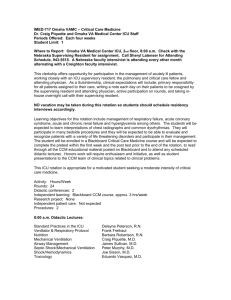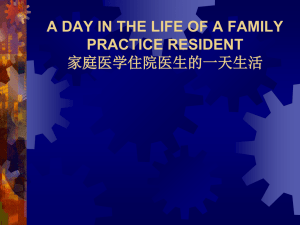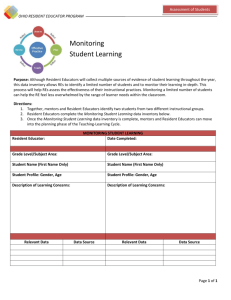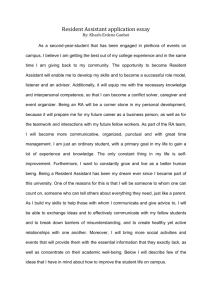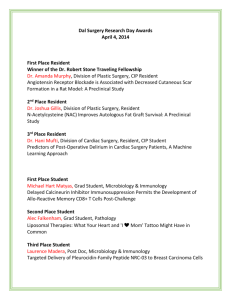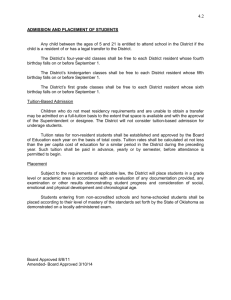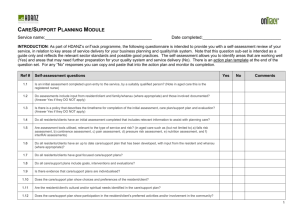GUIDELINES FOR WARD HOUSESTAFF
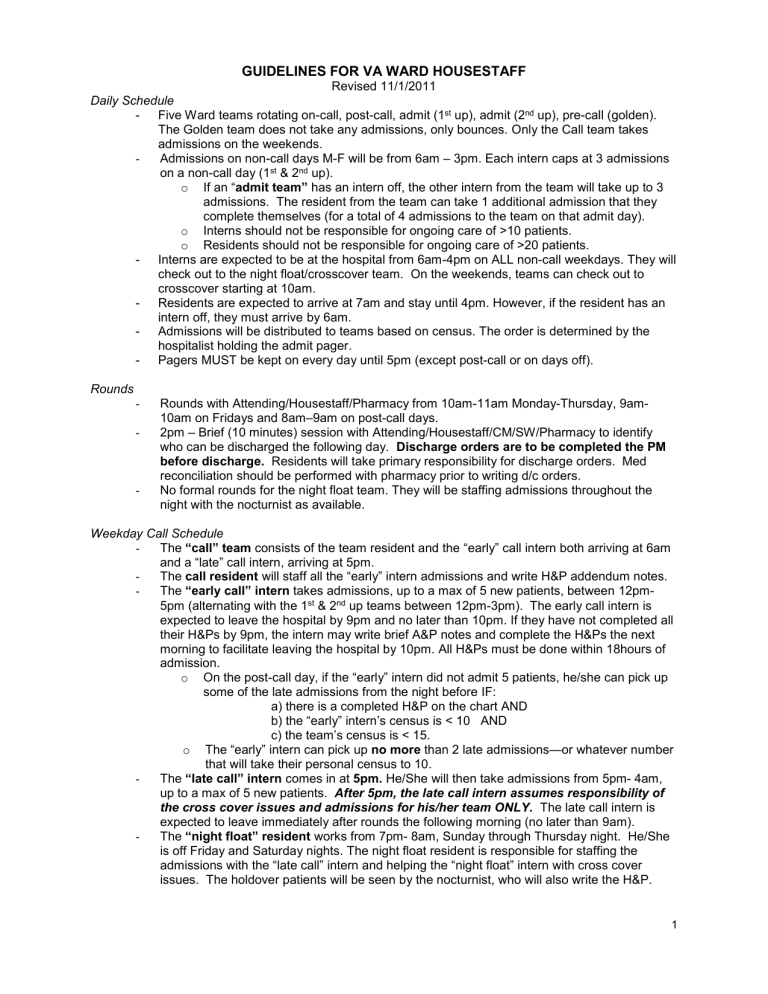
GUIDELINES FOR VA WARD HOUSESTAFF
Revised 11/1/2011
Daily Schedule
- Five Ward teams rotating on-call, post-call, admit (1 st up), admit (2 nd up), pre-call (golden).
The Golden team does not take any admissions, only bounces. Only the Call team takes admissions on the weekends.
Admissions on non-call days M-F will be from 6am – 3pm. Each intern caps at 3 admissions on a non-call day (1 st & 2 nd up). o If an “ admit team ” has an intern off, the other intern from the team will take up to 3 admissions. The resident from the team can take 1 additional admission that they complete themselves (for a total of 4 admissions to the team on that admit day). o Interns should not be responsible for ongoing care of >10 patients. o Residents should not be responsible for ongoing care of >20 patients.
- Interns are expected to be at the hospital from 6am-4pm on ALL non-call weekdays. They will check out to the night float/crosscover team. On the weekends, teams can check out to crosscover starting at 10am.
- Residents are expected to arrive at 7am and stay until 4pm. However, if the resident has an intern off, they must arrive by 6am.
- Admissions will be distributed to teams based on census. The order is determined by the hospitalist holding the admit pager.
- Pagers MUST be kept on every day until 5pm (except post-call or on days off).
Rounds
Rounds with Attending/Housestaff/Pharmacy from 10am-11am Monday-Thursday, 9am-
10am on Fridays and 8am –9am on post-call days.
2pm – Brief (10 minutes) session with Attending/Housestaff/CM/SW/Pharmacy to identify who can be discharged the following day. Discharge orders are to be completed the PM before discharge. Residents will take primary responsibility for discharge orders. Med reconciliation should be performed with pharmacy prior to writing d/c orders.
No formal rounds for the night float team. They will be staffing admissions throughout the night with the nocturnist as available.
Weekday Call Schedule
The “call” team consists of th e team resident and the “early” call intern both arriving at 6am and a “late” call intern, arriving at 5pm.
The call resident will staff all the “early” intern admissions and write H&P addendum notes.
The “early call” intern takes admissions, up to a max of 5 new patients, between 12pm-
5pm (alternating with the 1 st & 2 nd up teams between 12pm-3pm). The early call intern is expected to leave the hospital by 9pm and no later than 10pm. If they have not completed all their H&Ps by 9pm, the intern may write brief A&P notes and complete the H&Ps the next morning to facilitate leaving the hospital by 10pm. All H&Ps must be done within 18hours of admission. o On the post-call day , if the “early” intern did not admit 5 patients, he/she can pick up some of the late admissions from the night before IF: a) there is a completed H&P on the chart AND b) the “early” intern’s census is < 10 AND c) the team’s census is < 15. o The “early” intern can pick up no more than 2 late admissions —or whatever number that will take their personal census to 10.
The “late call” intern comes in at 5pm. He/She will then take admissions from 5pm- 4am, up to a max of 5 new patients. After 5pm, the late call intern assumes responsibility of
the cross cover issues and admissions for his/her team ONLY. The late call intern is expected to leave immediately after rounds the following morning (no later than 9am).
The “night float” resident works from 7pm- 8am, Sunday through Thursday night. He/She is off Friday and Saturday nights. The night float resident is responsible for staffing the admissions with the “late call” intern and helping the “night float” intern with cross cover issues. The holdover patients will be seen by the nocturnist, who will also write the H&P.
1
The “night float” intern works from 4pm- 6am, 7 nights per week (there are two night float interns who switch off working several nights in a row). The night-float intern is responsible for crosscover issues only and will NOT do any admissions.
On the weekend, one of the night-float interns will be a “day”-float intern to do crosscover from 10am to 4pm. They will checkout to the “night” night-float at 4pm, who will assume crosscover issues from 4pm to 6am, as usual.
Admissions from within the VA facility CALLED by the deadline count to that team no matter what time the patient hits the floor. You can go to the Clinic or the ER to see the patient.
Weekend/Holiday Call Schedule
Weekend call (Saturday/Sunday) is 6am to 4am with only the call team admitting. The call team resident will perform a traditional 28hour shift and stay overnight with the night float intern and late call intern for the team. The early intern & late intern rules as outlined above still apply on the weekends.
Weekday Holidays (eg: Columbus day, Memorial day): 1 st up & 2 nd up teams admit from
6am – Noon. Each team will have 1 intern off & admissions will alternate in sequential fashion. The earliest the admitting teams can check out to the night float intern is noon. On holidays, admitting day teams cap at 3 patients per team. The call team begins to admit at noon, or earlier if the morning teams have already capped.
Thanksgiving day, Christmas day, and New Years day : Regardless of what day of the week these holidays fall on, they will be treated as weekend days. The earliest the the day teams can check out to the night float teams is 10am. The call team is the only team that takes new admissions on these days.
Holdovers
Holdovers occur after a team caps (rules for capping are outlined above). Holdovers are also any admissions between 4am-6am.
The nocturnist/moonlighter will be responsible for all holdovers (orders & notes).
On the rare occasion when there is no nocturnist/moonlighter, the ER physician will write admission orders for Holdover patients. The ER physcian does not write H&Ps! The resident on call or night float resident will need to write a brief holdover note that states, “Patient assessed. ER Physicians’ orders reviewed. Stable for holdover until morning team arrives.”
Please make sure this statement is actually true! Some holdover patients will actually not be stable & will require some time and effort. o If a nocturnist/moonlighter is not present during a call night, the resident (in addition to their team admissions) is also responsible for handling urgent pages & issues from the CLC, staff services, and consult team. Please call the hospitalist pager with any questions! They are responsible for coming into the hospital to help you if there is a sick patient.
Bounce Policy
Patients readmitted while the senior resident is still on service will bounce to the resident.
A team is eligible to accept bounce patients every day except post-call days .
If accepting a bounce would be a major hardship for a team due to the number of other admissions already accepted for the day, the senior resident should speak to the attending and/or the chief resident about asking the on call team to accept the bounce for that day only.
As a general rule, if the primary team is not in-house, all bounces should be seen, admitted & have an H&P written by either the hospitalist carrying the admit pager (during the day) or the nocturnist. The nocturnist on call will be listed in the CPRS telephone directory under
“Geriatrics physician 7pm-7am.” The following day the bounce goes to the primary team. If for some reason the hospitalist is unable to see the patient, he/she will have the call team take the bounce as an admission, who will then hand this patient off to the primary team the following day.
WeekEND ICU bounces: these do not count as an admission to the call team OR the primary team. The call team is not to write an accept note, they are only to cross cover the patient. The on call team should make sure that the patient is stable & double check the orders. The patient may NOT be counted as an admit for the primary team on the Monday following that weekend. (For example, if the patient was transferred out on Saturday and the primary team picked up the patient on Sunday, it will not count as an admission on Monday.)
2
Exception: If a team is on call Saturday and Sunday and they receive an ICU bounce on their call day, this patient counts towards their admission cap.
WeekDAY ICU bounces: patients will count as an admission ONLY to the primary team to whom the patient is bouncing. If the floor team is post-call, or not in house at the time of the transfer, the ICU team will check out the patient to the on call team so that all issues are covered but that team DOES NOT write an accept note or count the patient as an admission.
The on call team should make sure that the patient is stable & double check the orders. The original admitting team will count the patient as a full admit either on the day the patient comes to them or on the next day if they were post-call/out of house when the patient came out of the ICU.
WeekEND bounces from the ED, clinics, or hospital transfers: these count as an admission for the call team that does the admission since they have to write a new H&P, but not to the primary team that will receive the bounce the following weekend day – they will simply write a daily progress note on the weekend day. If the patient was admitted on
Sunday night, the primary team may count them as an admission on Monday, since Monday is an admitting day.
WeekDAY bounces from the ED, clinics, or hospital transfers: these will count as an admission for both the day admitting or call team and the primary team the following day.
Bounces on GOLDEN days: count as an admission on the following call day, whether this is a weekday or weekend.
Although the bounces that don’t count to the primary team on the weekend, they will add to their total census and therefore, affect their future admissions the following day.
If the resident has a day off when the team receives a bounce, the on-call resident and/or attending will assist the intern. Please let your attending know that you received a bounce.
If a patient bounces on the last day of service AND the senior resident has left for the day, the admission stays with the admitting team.
If a resident does two consecutive months, he/she is only responsible for bounces only during the current month.
Days Off
- There will be 4 days off in 4 week period and 5 days off in a 5 week period per intern/resident.
- Residents may have weekends and pre-call/golden days off ONLY. No admitting days off.
- Interns may have weekends, pre-call/golden and occasionally “2 nd up” days off.
- No first up days may be taken off (unless rare exceptions made by Chief)!
- No days off on Intern or Resident Switch days unless prior approval with the Chief Resident.
- You will receive a Days Off Calendar on Resident Switch Day with available days off marked
for your team. You may only choose among those days.
ICU Transfers:
There will only be one discharge summary for the patient. o It will be done by the Floor Resident if the patient is discharged from the floor. The
ICU Resident will make sure that the transfer note writte n on the patient’s last day in the ICU is sufficiently complete to permit the Floor Resident to easily dictate the ICU course in the discharge summary. o If a patient expires in the ICU or within 24 hours of transfer to the floor, is transferred to another hospital from the ICU, or is discharged home from the ICU, the ICU
Resident who admitted the patient to the ICU will do the d/c summary. If the discharge/death of the patient occurs after the resident switch day, the ICU Resident who either discharges or pronounces the death will be responsible for the d/c summary.
In the unlikely instance that the Floor Resident and ICU Resident disagree over the appropriateness of a transfer in or out of the ICU, these guidelines should be followed: o If the patient is moving from the floor to the ICU, the Floor Resident has the final say, unless overruled by the Intensivist. o If the patient is moving from the ICU to the floor, the ICU Resident will have final say unless overruled by the Hospitalist. o If in doubt, discuss with your attending. There is always a hospitalist and intensivist on call 24/7 if a resident ever needs help/guidance.
3
Transfers into or out of the ICU must have a transfer summary written by the transferring service. Please use the progress note titled “PATIENT TRANSFER NOTE.” This is in addition to the daily progress note.
The Transfer Summary MUST include: o List of Diagnoses o List of Procedures, including Lines, Intubations, Major Radiology studies o Consultations o Summary of ICU or Ward Course
Emergent Transfers to Outside Facilities
If you need copies of any imaging studies to send with the pt (you probably will), call radiology immediately with the images you need placed on a CD (do this first to give them time to do it while you’re doing the rest of what’s needed. You may need to call in the CT
Tech at night to get CT images on a CD (they MUST come in if you call).
Transfer must be approved by the AOD . Call admitting at 2627 or 2621 to get the number.
Place “Fee Basis Consult,” under consults then click fee basis inpatient & complete.
Call the hospital you’re transferring to (Outreach at Good Sam 839-4444, Bed Placement at
Barrows, etc) to obtain an accepting physician. You will first need to speak with the specialist
(neurosurgeon, cardiologist, etc) so they can accept the patient and then you need to find an accepting hospitalist (at Banner, please place the patient on AMS teach or SAFA teach if possible). The coordinators will be able to arrange phone calls for you.
Place “Interfacility Transfer Consult” with all of the information about the patient’s case, the transferring location & the accepting physician’s name.
Discharge orders cascade (do as a discharge to another facility)
Patient or their surrogate must sign paper consent for transfer.
Stat discharge summary : most of the time this should be typed out in a “Medical Resident
Note” (to print & send with the patient), & then dictate a discharge Summary right off of that.
Text order : “D/C (Transfer) to ____ hospital when bed available.”
If you have any questions contact the nursing supervisor.
CLC Transfers :
All transfers to the CLC must take place prior to 3pm.
The extended cutoff time is to be helpful/flexible, not to increase their workload late in the day. Every attempt should be made to get patients to the CLC prior to noon.
Prior to transfer, verbal report must be given to the attending at the CLC. Patients should not just arrive at the CLC without having previously communicated with the accepting physician
(Drs. Buckhout and Nordberg).
How to access Rosters (with Housestaff schedules for VAW and ICU/electives)
Go to Internet Explorer. The VA Intranet home page will come up.
On the blue bar on the left hand side, select “Patient Care/Clinician Toolbox”.
-
Then, under this heading, click on “Medicine”.
Next, select “Housestaff schedules”
From here, you can choose the VAW or ICU/electives rosters. These give you all the schedule details including members of the teams, pager numbers, days off, etc. It will also tell you who is on elective so you can page the subspecialty residents with consult questions.
Continuity Clinic while at the VA
Residents will not have clinic while on VA wards (EXCEPT Med-Peds residents).
Night float team (interns and resident) will not have any clinic for the month.
On call & post-call interns do not have clinic.
It is the residents’/interns’ responsibility to check the clinic schedule and bring any discrepancies to the chief’s attention immediately.
Overnight Calls by Other Services (Podiatry/Surgery/Ortho patients)
The nocturnist/moonlighter will handle all calls by these outside services. In the rare instance that there is no nocturnist/moonlighter, the on call resident or night float resident will direct the nurse to call the primary team (ortho/podiatry, etc) UNLESS it is an emergency. Then the resident will need to see the patient right away, regardless of which service they are on. If
4
significant, the medicine resident can transfer them to the medical or ICU team (depending on the level of care they need) and accept them as one of their admissions.
Non-urgent medical issues involving these patients can wait until the hospitalists are here in the am (the other service must place an IM consult & the resident should notify the staff service attendings).
Podiatry patients with issues related to pain, wound care, abx, etc should be taken care of by the podiatry resident.
Lastly, there is always either a hospitalist, nocturnist/moonlighter available 24/7 if a resident ever needs help. Do not involve ER staff.
Death Notes
If one o f your patients or a cross cover patient dies, you must write a note titled “Death Note” in the chart. Per VA policy, an autopsy MUST be requested on all deaths in the Medical
Center and this request documented in the death note. The on-call team will notify the family members of the death when it occurs, but will not request an autopsy. The primary team will make a follow-up call to the family the next day and will request the autopsy at this time . This will give the family some time to adjust, and it is better for the primary team to make the request since they know the family better.
Work hours and time between shifts
RRC mandates a maximum of 80 duty hours per week for all residents, averaged over 4 weeks . Duty hours are defined as all patient care activities and conferences. Duty hours do not include reading and preparation during time spent away from duty site.
Interns and residents should have a 10-hour duty-free period between shifts or 8-hours duty-free if signing out to a night-float.
Interns may NOT work more than 16 hours straight.
Residents may NOT work more than 28 hours straight.
Day starts NO LATER than 6 am; this is tracked by the computer log-in time by the
Associate Programs Directors.
The residents and interns should log in on their computer when they first arrive and log off at the end of the day; this is how work hours can be tracked.
Notify the Chief Resident if there is an issue with work hours during the month.
Conferences
Attendance is mandatory (unless post-call or day off).
Academic Half Days are every Tuesday from 9:15am – 12:45pm .
Morning Report is at 9:30am on Monday, Wednesday, and Thursday. Morning Report is held in room 435C, on 4C. The door code is 7333.
On-call resident will present the case unless otherwise noted by Chief Resident.
Grand Rounds is at 11am Friday in the ACC basement conference room.
Attending Coverage
Attending staff in general medicine and all medical and surgical subspecialties are available by pager every night. If an attending does not answer your page, ask the operator to call them at home.
Call Schedule is in CPRS (Telephone Directory) and with the operator.
On weekends and holidays the attending hospitalist will meet with the post-call resident to review the previou s night’s admissions.
If your attending is off for the day, make sure you touch base with the “on-call” attending if you get a new patient, i.e. bounce back/ICU transfer to your team on a Golden Day or weekend day. An attending note needs to be on the chart within 24 hours of a patient being admitted or transferred to the floor.
Charting
History and physicals should be typed by intern or resident (medical students H&Ps are not sufficient). Interns are expected to write all their own H&Ps. Residents will do addendums.
Student’s notes need to be reviewed and co-signed by the intern or resident.
5
DO NOT cut and paste large reports of labs, imaging studies, procedures…this creates clutter and this type of information can be easily referred to in the computer and doesn’t need to be detailed in the notes.
DO NOT cut and paste from other physician’s notes or from your own note day in and day out.
-
DO NOT cut and paste another doctor’s signature into your note, even if it is part of a report.
-
Process your “Alerts” daily.
Discharge summaries
Discharge summaries MUST be dictated within 3 days of discharge.
Any d/c summary that is overdue by 10 days will affect attending performance measures. If any d/c summary is overdue, the resident will be subject to a downgrading of his/her performance in the area of professionalism which is part of the core competencies required for successful completion of residency and this will be reflected in your attending evaluation for the month.
Additional sick call will be provided for those with discharge summaries that are more than 14 days overdue.
Discharge summaries may not be typed – ONLY DICTATED . No abbreviations can be used (i.e. you must dictate chronic obstructive pulmonary disease, NOT COPD).
Transfers to another service (other than the MICU), such as surgery, podiatry, vascular, staff, ortho, etc, require a dictated interim summary —a typed transfer summary is not adequate.
Patients on service for 7 or more days MUST have Off Service Notes written on the chart by the resident leaving that service.
Patients discharged on resident switch day are to be dictated by the previous resident.
Those delinquent in discharge summaries will be pulled out of their next rotation to complete their discharge summaries, backup coverage and repayment will be the responsibility of the resident.
ICU residents are no longer required to dictate Interim Discharge Summaries. Instead, a
Transfer Summary note is required (separate from the progress note that day) upon transfer or at end of month if the patient has been in the ICU 7 days or more. The resident who discharges the patient will then use this to dictate the Discharge Summary.
Staff Service
When services are busy, appropriate patients may be transferred to the Staff Service.
Appropriate patients are medically stable and require ongoing hospitalization for rehab, IV antibiotics, awaiting therapeutic INR, etc.
The Chief Resident and Program Directors will give priority to the busiest teams.
The resident dictates a transfer summary from the time of admission through time of transfer.
A resident may not transfer a patient if the transfer would leave the intern with fewer than 6 remaining patients.
Security
- Federal regulations prohibit you from visiting pornographic or gambling sites.
Log off all computers (ctrl-alt-del) when you are done so that some person doesn’t come after you and search prohibited sites on your password.
All papers with patient information on them must be secured in a drawer or in the burn box when you are not in the team room. The burn boxes MUST be emptied weekly into the blue security bins (there is one in the Morning Report room & another in room 4305).
Personally identifiable health information, i.e.
, names and last 4s or DOBs, CANNOT be placed on unencrypted thumb drives, PDAs, logbooks or any other electronic medium.
No unauthorized thumb drives.
Keep your valuables with you at all times, as there have been thefts out of the team rooms. If you are on call, please use the lockers in the call rooms.
If you are here late, please use the Security escort to your car – call x 6420.
Codes/RRT
Code Team o During the day (8am-3pm), the team is comprised of ICU resident, ICU fellow & ICU attending.
6
o At night (3pm-8am), the Code team is comprised of the ICU resident and the night float intern. The ward resident and on-call intern should show up and offer help. o The resident who runs the code is responsible for writing a code note.
Rapid Response Team o During the day (8am-3pm), the team is comprised of the ward resident (or night float resident) and the on-call intern. o At night (3pm-8am), the Rapid Response team is comprised of the ward resident (or night float resident), the on-call intern, and the night float intern.
During code arrests: o The RTs will supervise assist with airways at night/weekends. After hours, intubation is the decision of the ICU Resident. During regular work hours, call the fellow or attending for all airway issues STAT. o The surgical resident/intern can place lines during a code if needed. o The ICU fellow handles airway by day and if necessary, procedures, during a code.
Although the floor team can help if needed as well.
Additional Info
- Restraint orders: o If restrained for patient safety (i.e. pulling lines), order “initiate restraint protocol”, also may be initiated by nursing. Must be signed within 24 hours by the team. o If restra ined for behavioral problem, order “seclusion and restraint”, patient must be checked on and order rewritten q4 hrs.
When an ortho, podiatry, or urology patient moves to any of the ICUs, the patient is automatically assigned to Medicine for the duration of the ICU stay because Ortho and GU do not have ICU privileges and it is likely in the patient’s best interest.
Teleradiology24/7 Reports for CT Scans Done at Night
- A copy of each Teleradiology report is now placed directly into the patient chart. It is no
longer faxed to the floor or ED/LSU. If you do not receive a STAT report, call Radiology or
page the on-call Radiology tech.
- VA Radiologists do a formal “over read” the next morning.
7
